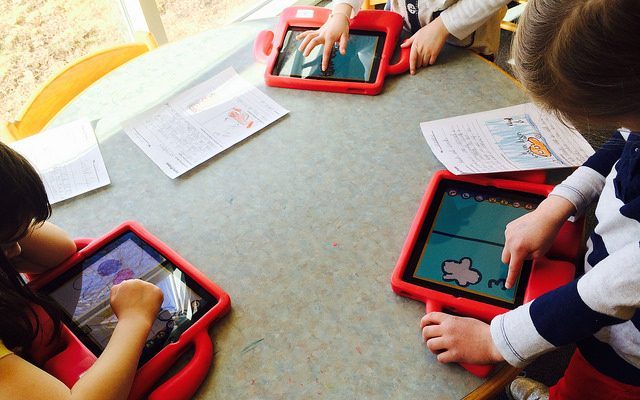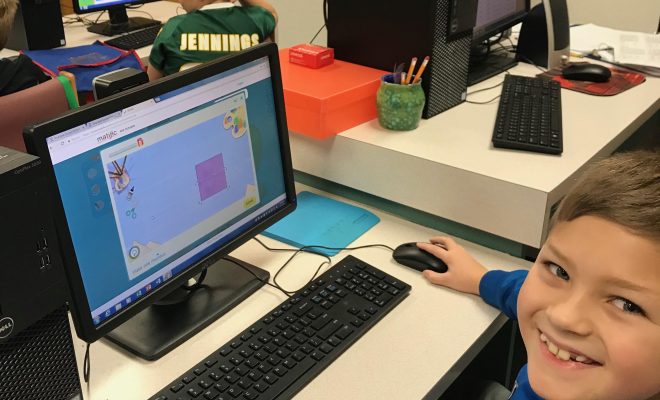A Digital Future: What Will EdTech Look Like By 2117

Rapidly changing technology continues to make its mark on K-12 learning. Let’s take a look at the future and see how technology will improve education in the next 100 years. What will be the new innovations in EdTech? What will future classrooms look like? Will the need to study medicine, law, and science disappear when robots start working in these professions? What about art? Sure, no robot can be better than David Bowie, Leonardo Da Vinci, or Shakespeare (not yet), but with the number of innovations we see every day, we can’t be sure it won’t happen. While these innovations could have some detrimental side effects (such as job loss, impacts to the economy, etc.), they also have their advantages. It is up to us to use these innovations with caution and maximize their benefits. Here are the technologies that I believe will transform education by 2117.
Horizon #1: In the next year, or less.
Widespread use of makerspaces: Imagine the hands-on fun and learning that happens at play stations throughout a preschool room, then add some really cool edtech tools like an earthquake table, cutting laser, high-tech microscopes, or 3-D printer. Then give the students real-life research to complete. Now you have imagined a makerspace, a blended workspace growing in popularity.
A makerspace is a shared learning experience long used in the Maker Culture, but now being honed for classrooms. They combine DIY crafts, manufacturing, engineering, and technology. Makerspaces are not limited to K12; Colleges are developing maker spaces to prepare students to solve real life problems. These stations can be mobile and shared, to decrease the cost.
Makerspaces fit well into the growing trends of Project Based Learning and Deeper Learning. Project-based Learning is learning which happens as students complete authentic projects. Deeper Learning is the process in which students meet and work with other students from around the world (Global Collaboration) as well as with experts in the field, through the use of technology.
Blended Education is another technique that will grow in significance. Classrooms will see an increase in the use of technology blended with traditional student-teacher interaction. Driven by algorithms; students will be placed in groups and given assignments. Students will often work collaboratively, broken into groups through a calculation of strengths, weaknesses, and interests.
Horizon #2: Within two to five years.
Widespread use of personalized learning: A tech-created schedule will move students through the day according to progress, focus, and interest while integrating each person’s needs with the needs of the class as a whole. Teachers will float from group to group as the face-to-face tutor and coach and periodically teach a lesson. NPR reviews this type of classroom this report, Meet the Classroom of the Future. Do you see it?
Adaptive learning will personalize learning in our classrooms. Adaptive education, at its best, is using technology to measure a student’s strengths and weaknesses and then adapting their education accordingly. When the goal of adaptive education is to develop the student, not meet pre-established standards, then real education can take place.
Horizon #3: Within ten years.
Interactive surfaces while working in groups will become a reality. The trend in education is to have collaborative group learning. We are currently at the point where every child has his or her own electronic device. As the group learning model improves, it will be harder for children to follow courses separately on their personal devices. What would happen if the desk they sat at was itself a computer? That way, the group can use a multi-touch interface and collaborate better, with less time comparing what is on each device.
Interactive surfaces are already a reality, but the costs are still big. Just a few decades ago, computers were expensive and considered a luxury item, so it’s safe to predict that these interactive surfaces will become more affordable as time passes and will be used in schools for everyday basics.
Horizon #4: Within twenty years.
Tracking every student’s move will become a reality. Student tracking is already a reality in some schools. In the future, it’s entirely plausible that all schools will track students and teachers using Radio Frequency Identification (RFID). There is currently one obstacle: costs. Once there is a cheaper way to replace lost or stolen RFIDs, it will become more common to track when students attend school and their trips around the open classroom. This way, by knowing where and when students are, more time can be spent giving instructions and explanations.
Many parents would argue that it is not fair to track their child’s every move all the time. On the other hand, this can greatly improve safety in schools. In modern schools with more than 1,000 students in a classroom, it could be very hard to locate missing child without tracking.
Horizon #5: Within fifty years.
Students will become teachers. Teachers will become facilitators and children will teach each other based on their own interests. While this concept seems strange now, it has a significant probability of becoming a reality one day. Even younger children are capable of finding their own path, and by allowing them to follow their individual interests while they are growing up, we will have more satisfied people in the future.
Horizon #6: Within 100 years.
There will be many new tools. Educational tools are evolving, and it will be interesting to see what happens in the future. We can predict that instead of using pens and pencils to write on paper or keyboards to write on computers and tablets, one day, children will use Google glasses (or its successor) to transfer their thoughts and notes on a computer. Other futuristic thoughts include new tools to protect devices from viruses, Cloud Learning (which would eliminate paper), increased use of e-communities, hologram lessons, and international collaboration.
Conclusion
Imagining the edtech reformation of education we will see by 2117; you may feel like you are falling through the rabbit hole. But don’t be frightened, just buckle-up and enjoy the fall into the brilliant future of edtech and education. In coming posts, I will take a closer look at each of these technologies and their implications on K-12 learners. Which do you think will have the greatest impact?




